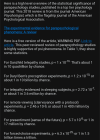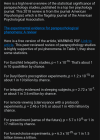Giddierone
Senior Member.
I'm curious about the anecdote and research experiment mentioned by Sheldrake in Ep.6 of TT. Where a "mentally disabled" boy separated from his mother in a different laboratory is able to get around 30% correct answers (yes, very different to the 100% accuracy claimed in TT) in a telepathy test. The test was apparently reviewed by three magicians who could not detect if there was a code used between the mother and son.
I wonder if Akhil and his mother would agree to a test under similar conditions?
Here's how Sheldrake describes it in his book The Sense of Being Stared At (2013):
I've not yet read the paper which the anecdote is based on:
Recordon, E. G., F. J. M. Stratton, and R. Peters. 1968. "Some trials in a case of alleged
telepathy." Journal of the Society for Psychical Research 44: 390-99.
But, have seen it referenced elsewhere as an example of deception—although I don't know the reasons put forward for why it was deception.
Maybe someone is familiar with it? I wonder if the same critique of it would apply to Akhil & his mother.
Source: https://youtu.be/8h1rcLyznK0?si=fWzPc6Jk8mpFu706
Which is given an critical review by Katherine Beals, that questions who is controlling the communication when hand-held letter boards are used.
https://www.facilitatedcommunicatio...ers-a-documercial-for-spelling-to-communicate
I wonder if Akhil and his mother would agree to a test under similar conditions?
Here's how Sheldrake describes it in his book The Sense of Being Stared At (2013):
When I was doing research in the Department of Biochemistry
at Cambridge University, I used to enjoy talking with Sir Rudolph
Peters, a former professor of biochemistry at Oxford, who had retired
to Cambridge and worked in our lab, still doing experiments. He was
charming, his eyes sparkled, and he had more curiosity about the world
than most people half his age. One day we were talking in the laboratory
tearoom, and the subject of telepathy came up. I dismissed it with the
knee-jerk skepticism I had absorbed as part of my scientific education.
To my surprise, he told me that he had actually investigated a case of
apparent telepathy and concluded there was something to it. He gave me
a copy of his paper, summarizing the tests he and two colleagues had car-
ried out together. He also lent me tape recordings of the experiments so
that I could study the details for myself.
This case concerned a mother and her son with complex needs. The boy
was born with impaired vision, was partially paralyzed, and was also mentally
disabled. When an ophthalmologist tested him at regular intervals, starting
when the boy was five, he was surprised to find that the boy did much better
in standard eye tests than his very limited vision would have allowed: "I was
amazed when trying to estimate his visual acuity by his astonishing guess-
work when asked to identify letters, etc. It gradually dawned on me that this
guesswork was peculiarly interesting; and I came to the conclusion that he
must be working through his mother." The boy could read the letters only
when his mother was looking at them. This discovery raised the possibility
that they were somehow communicating telepathically."
Peters and his colleagues did some preliminary experiments at the
family's home. The mother and son were separated by a screen, so no
visual clues were possible, and in any case the boy was almost blind. The
mother was shown a series of written numbers or words of one syllable,
and in many cases the boy guessed correctly what they were.
The next experiments were carried out over the telephone and were
tape recorded. The boy was nineteen years old at the time. The mother
was taken to a laboratory in Babraham, six miles from Cambridge, while
the boy remained at home. The experimenters prepared cards on which
numbers or letters were written, and these were piled-up, face down, in
a random sequence. One of the researchers turned up the first card and
showed it to the mother. The boy, six miles away, then guessed what it
was. The mother responded to his guess by saying "right" or "no." Then
he guessed the next card, and so on. Each test lasted only a few seconds.
Out of 58 tests with numbers, the boy guessed 20 correctly the first
time (34.5 percent) and 19 correctly on the second attempt (32.7 percent).
The numbers 1 through 10 were used, hence there was a 1-in-10 chance
of guessing correctly by chance (10 percent). The boy's actual result was
far above chance and was highly significant statistically, with odds against
chance of 50 million to one.*
In the tests with letters there were 45 trials, and the boy guessed right the
first time in 17 (37.8 percent) and the second time in 12 (26.7 percent). Here
the probability of guessing correctly by chance was only 1 in 26 (because
there are 26 letters in the alphabet), and the odds against this result being
due to chance are greater than 10'¢ (10 with 15 zeros after it) to 1!
Peters and his colleagues carried out further tests over the telephone
with similar results. In a total of 479 trials with numbers, the boy was
right 32 percent of the time on his first guess, with astronomical odds
against chance of 10°' to 1. Ina total of 163 tests with letters, on his first
guess he was again right 32 percent of the time; the odds were even more
astronomical, 10" to 1.
The telepathic communication between this mother and her son was
vastly superior to anything observed by parapsychologists in standard
laboratory experiments. In most of their tests, the senders and receivers
hardly knew each other, and the telepathic communication between them
served no biological or emotional needs, other than a desire to do well in
scientific tests. By contrast, this mother and son were very close emotion-
ally, and their communication served very practical needs on a day-to-day
basis. As Peters remarked, "In every respect the mother was emotionally
involved in trying to help her backward son."**
Of course, many parents are emotionally involved in helping their chil-
dren. The telepathy between this Cambridge woman and her son may dif-
fer only in degree from that between more ordinary parents and children.
Perhaps many parents influence their children telepathically, as well as com-
municating by facial expressions, body language, words, and other recognized
means. At the same time they may be entirely unaware of this telepathic con-
nection. We will return to a discussion of these ideas in chapter 13.
*In their published paper, Peters and his colleagues did not provide a statistical analysis.
At my request, Jan van Bolhuis, assistant professor of statistics at the Free University of
Amsterdam, has analyzed their results, using the binomial test, and the figures I quote
in the text are the result of his calculations.
-----------------
+The only problem with these remarkably successful tests was that the boy's mother
wanted to see the next card before she said "right" or "no" in response to the guess for
the previous card. This left open the remote possibility that she was somehow pass-
ing information by an unconscious code in the intonation with which she spoke these
words. Peters and his colleagues thought this was extremely unlikely, and they could
detect no trace of such a code in the tape recordings of the test sessions. Moreover, the
boy was severely retarded mentally, and the test took place so fast that the use of a code
seemed practically inconceivable. In addition, the tapes were listened to carefully by
three magicians, all members of the Magic Circle, and they, too, were unable to detect
any possible code. I also listened to them myself and could see no possibility of a code
in the mother's words, or in any other possible sounds.
I've not yet read the paper which the anecdote is based on:
Recordon, E. G., F. J. M. Stratton, and R. Peters. 1968. "Some trials in a case of alleged
telepathy." Journal of the Society for Psychical Research 44: 390-99.
But, have seen it referenced elsewhere as an example of deception—although I don't know the reasons put forward for why it was deception.
Maybe someone is familiar with it? I wonder if the same critique of it would apply to Akhil & his mother.
There's more examples of this in the (even more saccharine than The Telepathy Tapes) film Spellers.She is clearly moving the board between each trial (it is retracted then replaced each time)
Source: https://youtu.be/8h1rcLyznK0?si=fWzPc6Jk8mpFu706
Which is given an critical review by Katherine Beals, that questions who is controlling the communication when hand-held letter boards are used.
https://www.facilitatedcommunicatio...ers-a-documercial-for-spelling-to-communicate


